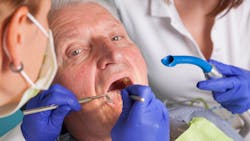In brief: International study on poor OH, dementia connection
Large study points to stronger tie between poor OH, dementia
A review of 47 longitudinal studies has found that people with poor dental hygiene are significantly more likely to develop dementia later in life. The study, published last week in the Journal of the American Geriatrics Society, looked specifically at those who hadn’t been diagnosed with dementia at the start of the study and found that people with poor oral health were 23% more likely to eventually develop some amount of cognitive decline, and 21% more likely to develop dementia. It also found that specifically tooth loss significantly increases the risk of both dementia and cognitive deterioration.
"Up-to-date" on vaccinations means getting most recent booster
With the recent release of bivalent boosters—those that specifically target Omicron subvariants that are causing most of cases of COVID in the US—the CDC says being up to date vaccination means completing a primary series and receiving the most recent booster dose recommended for a given age group. People are eligible to receive an updated booster two months after their last vaccination, whether it was a primary or booster dose; the only booster that is currently authorized for people 12 and older is the bivalent booster.
Ancient tooth shows early human activity outside of Africa
In one of the oldest signs of ancient humans outside of Africa, a 1.8 million-year-old tooth was found by a research student in the nation of Georgia. The molar was at the Orozmani dig site, dated between 1.77 and 1.84 million years old, in the Caucasus region. It joins other remains found at the site as some of the oldest evidence of hominins not in Africa.
The (not shocking) effects of common beverages on primary teeth
A recent study in Pediatric Dental Journal analyzed the effects of common beverages on deciduous teeth enamel, with methods and materials interesting, but results perhaps not shocking: The study indicated “Carbonated soft drinks and acidic juices resulted in drastic softening and a serious reduction in enamel surface hardness and loss of surface structure of deciduous teeth at two- and four-weeks erosive challenge.” Researches noted a "drastic burst" of consumption of carbonated soft drinks and juice among children during the COVID pandemic, and that if dental erosion is not controlled or stabilized, affected children may suffer from severe tooth surface loss, tooth sensitivity, poor esthetics, and eventually the risk of dental abscesses of the affected teeth.
About the Author
Elizabeth S. Leaver
Digital content manager
Elizabeth S. Leaver was the digital content manager for Endeavor Business Media's dental group from 2021-2024. She has a degree in journalism from Northeastern University in Boston and many years of experience working in niche industries specializing in creating content, editing, content marketing, and publishing digital and magazine content. She lives in the Boston area.
